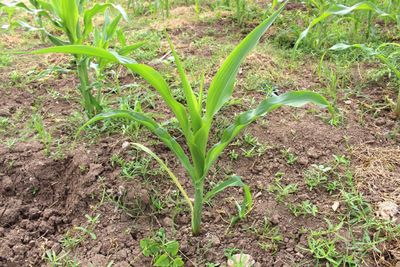Problems with Sweet Corn Seedlings
If your corn seedlings are dying, they are probably suffering from a type of disease that particularly affects the seeds of the sweet corn plant. These diseases can kill the seedlings or affect them enough that the stands don’t grow well. They are caused by a few different types of fungus and sometimes by bacteria, and may or may not cause rot. Diseased or rotting corn seedlings are more likely to simply die if they are planted in cold soil, but if planted in warmer soil, they may still sprout and grow. In this case, they will develop rot in the roots and at the stem near the soil line.
Preventing Sweet Corn Seedling Diseases
Prevention is always best, of course, and with corn seedlings, two main factors that promote disease are the quality of the seeds and the soil temperature and moisture level. Low-quality seeds, or seeds that are cracked or carrying a pathogen, are more likely to develop rot and disease. Cold soil temperatures, less than 55 degrees Fahrenheit (13 C.), and wet soil also promote disease and make seeds and seedlings more vulnerable. Caring for seedlings of corn the right way will help prevent any rot or disease. Start by choosing high-quality seeds, even if you have to pay a little more. Seeds that have already been treated with fungicide will guarantee they are not carrying pathogens into your garden. Don’t plant your seeds until the soil temperature is above 55 degrees F. (13 C.). Using a raised bed can help raise the temperature. You may also consider starting your seeds indoors and transplanting them outdoors when the weather cooperates, but transplanting corn is not easy. The plants don’t always respond well to being moved. If you try this, be sure to be gentle with it. Any damage to it can harm the plant. Sweet corn seedling diseases are not common issues in the home garden, but it pays to take precautionary measures anyway and to give your seedlings the best chance of growing into big, healthy corn plants.
